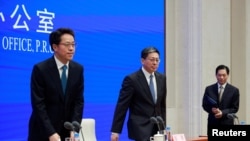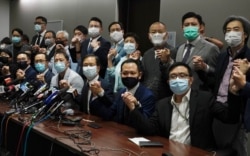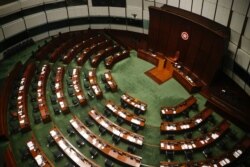China's national legislature has approved a resolution to overhaul Hong Kong's current electoral system, in a move seen as part of a broader campaign to quell opposition voices.
Top Beijing officials have insisted electoral reforms are needed to ensure that only "patriots" govern the former British colony, improving national security and establishing a "democratic electoral system with Hong Kong characteristics."
The latest move further tightens China's control over Hong Kong, reducing democratic representation and creating a pro-Beijing panel to screen candidates for "patriotic" fitness for public office.
Thursday's nearly unanimous vote to pass the reforms, greenlighting the biggest political shake-up in Hong Kong since the city's 1997 return to China from British control, was largely expected from the National People's Congress (NPC), the Communist Party of China's (CPC's) rubber-stamp legislative body.
Details of the legislation will follow and could be implemented within months.
In its current form, Hong Kong's Legislative Council (LegCo) has 70 members, of which 35 are elected every four years by popular vote from various municipal constituencies and district councils. The other 35 are selected by so-called functional constituencies — professional or special interest groups comprising corporations or business organizations involved in the electoral process.
According to China's state-run Xinhua News Agency, 300 Beijing loyalists will be added to the Election Committee, Hong Kong's electoral college, tasked with selecting the city's chief executive. For years, the 1,200-member Election Committee has been dominated by pro-Beijing voices, largely allowing China to pick the city's top official.
By expanding the Election Committee to 1,500 members, it is expected that many of the democratically elected district councilors will be replaced by Beijing allies.
Hong Kong's Legislative Council will see the addition of 20 new seats.
Lo Kin-hei, Chairman of Hong Kong's Democratic Party and Southern District Councilor, called Beijing's decision "unwise."
"If they wanted to improve the situation Hong Kong people face, they should actually make the Legislative Council more responsive to the people's voice instead of suppressing the people's voice," Lo told VOA.
"I think it is a very sad move for Hong Kong and I believe that in the future those legislative councilors will be less and less representative of the Hong Kong people," Lo added.
Former legislator Ted Hui, who has been living abroad since December, called the reforms a "huge step backwards."
"It's against the principles laid down in the Basic Law, that democracy should proceed step-by-step progressively, so it's a huge step backwards to the original position."
Hui, who held a seat in the LegCo from 2016 to 2020, was one of the 15 pro-democracy lawmakers who resigned in November before fleeing the country in the face of criminal charges. He believes Beijing fears losing control of the Legislative Council after a landslide victory for Democrats in Hong Kong's 2019 local district council elections.
The 2019 landslide, he said, made Beijing contemplate the possibility that Hong Kong democrats could eventually overpower pro-Beijing camps in LegCo.
Had Democrats secured more than half the LegCo seats, Hui added, it "would be the first time in history that Beijing [lost] control in LegCo in Hong Kong. It's very afraid of that happening."
Chinese University of Hong Kong political scientist Ma Ngok said massive voter turnout for the unofficial July 2020 primary elections organized by the pro-democracy opposition — in which some 600,000 residents turned out to cast ballots for more than 50 pro-democracy advocates seeking seats on the LegCo — also posed a threat to Beijing's political influence in the special administrative region.
"The extra high turnout of the primary elections, and the more radical candidates, actually alerted them a lot," he said. "That is actually the overall sentiment is they were very much against, so that also triggered the change."
The vast majority of candidates who ran in the unsanctioned contest remain jailed on charges of subversion.
U.S. Secretary of State Antony Blinken said in a statement that the electoral reforms resolution was an "assault on democratic institutions on Hong Kong."
The newly passed electoral reforms are seen as building on a controversial and sweeping national security law for Hong Kong. Adopted amid 2019's anti-government protests, the law makes it easier to punish dissidents and demonstrators in the city. It also bars acts of secession, subversion, terrorism and collusion with foreign forces in vague language that is widely open to interpretation and reflects draconian policies in mainland China.
Scores have been charged or jailed under the security legislation, including high profile activists like Jimmy Lai and Joshua Wong, former lawmaker Claudia Mo and law professor Benny Tai.














